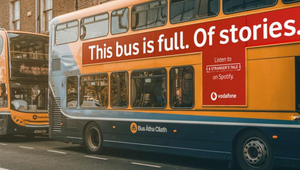It’s 1917. New York is booming. Two young Jewish entrepreneurs, Lawrence Valenstein and Arthur Fatt, set up a company. But anti-Semitism is rife. Their names could cost them business. So they call it Grey, after the colour of the wallpaper.
Today, Grey is one of the largest advertising networks in the world, with 10,000 employees in 96 countries, embracing every gender, race, religion and sexuality. But xenophobia is raising its ugly head once more, along with political isolationism.
In the week that the British government triggers Article 50 and begins the process of disconnecting the UK from the European Union, Grey London is showing its commitment to diversity and openness by re-establishing itself under the name of its original Jewish founders.
From March 27th, and for 100 days, Grey London will become Valenstein & Fatt.
In creating a new identify for Valenstein & Fatt, the agency has dropped the famous Grey San Serif for a new logotype set in Century Schoolbook, a typeface designed in 1917 by a foundry just a few blocks from Lawrence and Arthur’s first office. The modern but familiar design uses a black and white colour palette to reference the founders’ time in 1910s New York and emphasises the fact that diversity isn’t just black and white. The installation of a beautifully crafted Valenstein & Fatt logo set in solid concrete at the agency’s Hatton Garden offices symbolises the solid foundation and building blocks of Lawrence and Arthur’s actions.
But more than symbolic, this move is intended to be the spark for action in an industry that despite all the talk and the skills to make a difference, has been too slow to change.

Valenstein & Fatt will lead by example by:
1) Publishing its diversity data. Progress cannot be made without clear measures and transparency. The new study is independent and in depth and is based on the voluntary responses of 305 individuals, which represents over 60% of the agency and reported according to standards set by the British Office of National Statistics (ONS). Research developed in partnership with PSB examines roots, identity, education and lifestyle. It will be measured and shared annually and other agencies are encouraged to take it up as their methodology.





2) Launching a cross industry taskforce to identify the barriers to recruitment and retention of talent among ethnic minorities. The first gathering will be chaired by CEO Leo Rayman. He will be joined by writer and broadcaster Trevor Philips OBE, and the agency is inviting the most progressive agencies as well as leading organisations in this space to agree industry-wide initiatives and targets. Grey will also commit to targets for advertising output, to ensure that it is nationally representative.
3) Launching the Valenstein & Fatt Bursary to pay a year's rent for up to two young people from ethnic minority and disadvantaged backgrounds. To qualify, candidates must have been offered a job at Grey, be state educated and live outside of Greater London. Applications are open from this summer.
4) Inspiring the next generation, by working with 100 primary and secondary schools to introduce students to a career in the creative industries. Working with Exec Head Michelle Williams and education therapist Jodie Cariss and starting with the New Wave Federation primary schools in London’s Hackney, the agency will offer a tailor made programme for the schools involved, from assemblies to full day workshops, coaching and agency open days.
5) Developing its diverse talent. Recognising that recruiting people with different start points isn’t enough, 50 individuals identified as ones to watch will be matched and formally mentored by Grey's Executive and senior leadership. In parallel the agency will run community mentoring workshops open to any member of the agency who wants to participate.
Says Leo Rayman CEO of Valenstein & Fatt, “Recent events, from rising instances of hate crime and terror attacks in London to the triggering of Article 50, have sent shivers through our society and businesses, but it should also inspire a collective and determined attitude that our country and our companies will not change for the worse.”
Trevor Phillips OBE said: “By calling their agency Grey, what Valenstein & Fatt were saying is, whatever you call us, whatever you think about us, look at the dazzling quality of our work. You will never be able to resist us. So the lesson for leaders of today is to stop thinking that the great boss of the future looks like they looked when they were 21. We need our businesses to say to people; don’t be like us, be yourselves, do something new, bring something that no one has seen before. The thing that leads us to value people’s inherent differences is that spark of creativity that comes with diversity.”

























